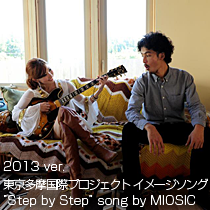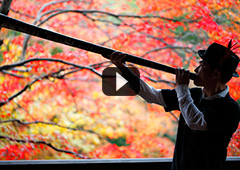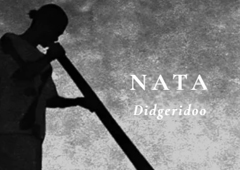I still remember the time I attended one of the Aboriginal ceremonies in the vastness of red land and wide-open sky, how moved I was by their attitude towards this untarnished tradition that has been passed down from their ancestors. Their culture have been passed on to younger generations through songs and dance, as they have no written language of their own. I became fully aware that my own life feeds upon other lives while learning their hunting culture and eating sea turtle's eggs and ants. This experience also reminded me of my childhood when I played outside in the mud and the dirt.
Musician NATA, Didgeridoo
TOP » Musician NATA , Didgeridoo



■ Musician NATA, Didgeridoo
Studied under the late Djalu Gurruwiwi, an international didgeridoo player. He experienced traditional music, hunting culture, and feasts in Arnhem Land, the sacred land of Australia's indigenous Aboriginal people and empathized with their way of interacting with nature. Through such interactions with them, he was given an Aboriginal name by them, which means “bringing blessings to nature.” NATA, who is Japanese, plays the didgeridoo because he believes that it is a primitive instrument that has been handed down since time immemorial, and that it can awaken and resonate with the animistic spirituality that humanity must share at the root of our consciousness. He continues to pursue a universal sound that connects the primitive to the future with the desire to convey the wonder of the power of life through the breath of the didgeridoo.

I spent most of my childhood in nature - anywhere at the beach, rivers, and mountains. In my teenage years, I joined a band. Our band hosted and played in many music events, but I was still uncertain of my future and dream. I came across the instrument didgeridoo, and was mesmerized by its unique sound and playing method, and started playing the instrument. I met and was inspired by both international and domestic didgeridoo players, and eventually flew to Arnhem Land, the northeast corner of Australia's Northern Territory.
Djalu Gurruwiwi would ask me to stop playing the instrument during the lesson when I could not make the sound that I sought for. He said, "I am happy to have a person who loves didgeridoo and came to visit us. However, your music sounds a bit too rigid. I have a country of my own and so do you. You should trust yourself and play your own music. That music will be your own sound." His message made me realize that I was only focused on learning the technique, that I was only seeing the surface when so much lies beneath. This learning process also made me realize the importance of everyday practice. I tried to relax in order to bring out the best of my sound, which Djalu approved of and complimented. I was happy that he saw the change in me. I was able to relax and truly enjoy the festivities at the very same night. My experience of their pristine culture is one of the best memories that I have.
The vastness of nature changed my mindset - I felt myself as an individual and yet still had a sense of belonging to the nature, things I would have never thought of if I had never made this trip outside of Japan. My trip to Arnhem Land was short, but it was wonderful to have first hand experience without any knowledge from internet, since it wasn't very common back in those days.
I maintain a daily practice, since I have goals to achieve while exploring my own sound and style. Whenever I face obstacles that impede my progress, I try to confront the challenges as advised by my teacher. Any decision that I make for myself gives me confidence. Every time I think I fail, new ideas and thoughts come up for me to move forward. I am grateful to have such experiences and know what I like and what I do not like now. Not to mention, I won't be here without my friends' support.
By learning traditional music and hunting culture of another country, I was able to see the culture and nature of my mother country. We can feel the season with cherry blossoms in the Spring and autumn leaves in the Fall. Japan has four seasons and wonderful traditions. I am currently based in a place full of nature outside of Tokyo. I started this beautiful day with a deep breath. I want to keep challenging myself by reflecting what I learned in the past.




















